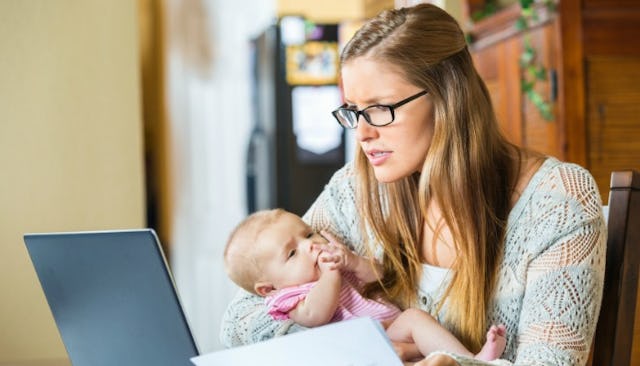How Our Newsfeeds Are Making Parenting More Difficult

As a parent, I am in a perpetual state of lacking for any number of things. Time, sleep, and patience top the list most days; other days, energy and confidence might also earn a spot among the front-runners. But one thing that I am not lacking is information. At the click of a finger, I can find information on just about any parenting issue imaginable, from co-sleeping to discipline strategies to affection. Not only is there copious (and often conflicting) information available from doctors, psychologists, and other assorted experts, but the amount of information available from parenting peers has increased significantly in recent years.
On any given day, my Facebook newsfeed is filled with information-heavy news headlines, parenting-related status updates, photos of friends’ children, parenting queries and responses, and op-ed style essays. Today alone, I’ve read articles about housework allocation, holiday decorations, helicopter parenting, gift ideas, and limits on sharing.
The depth and breadth of information can be overwhelming, confusing, and downright maddening at times, especially when a popular opinion or parenting philosophy conflicts with your own. I grew frustrated and confused and fretted that I my parenting choices were all wrong. And I began to wonder: Is the breadth of information available changing the way we parent? Is it possible for a parent to have too much information? And if so, how do we sift through it all without losing our minds so that we can find the information that is best for us and our family?
Are we becoming more sensitive and defensive, given our appetite for what-not-to-say lists and propensity for public shaming? Are we spending too much time debating nuanced, and relatively inconsequential, issues instead of talking about the issues that really matter? Are we exacerbating insecurities and doubts to which parents are naturally predisposed? And, what’s worse, are we inadvertently and unintentionally perpetuating new versions of the Mommy Wars via a million tiny parenting battles?
There are, undoubtedly, drawbacks to the vast array of information available to parents today. For instance, I am more likely to question myself and my parenting decisions as my access to information increases. I am also more likely to overthink an issue, making the proverbial mountain out of a molehill, rather than trusting my instincts or letting the issue resolve over time.
Social media has led to “snapshot parenting” and “sharenting.” And given the emotional soft spots involved in parenting, the ease with which we become privy to another parent’s decisions can spark defensiveness and judgment. In fact, a friend recently told me that a neighbor posted something on social media about sleep training, which was met with an onslaught of negative comments from so-called friends.
The internet has opened up worlds of information and, as a result, changed the way we interact with each other as parents and the ways we see ourselves as parents—changes that increased exponentially as a result of social media. Parents used to have in-person conversations about sleep training, thumb-sucking, and school curriculum, taking into account the nuances of an issue, while access to information was generally more limited. Today we hash out issues on Facebook or look to Dr. Google to answer our questions.
But let’s not pretend that parents of yesteryear had it any easier than parents do today. A parent’s range of information may have been limited to their peer group with shared lifestyle and perspectives, which could have, in turn, resulted in a lack of diversity. Loneliness was the elephant in nearly every family room. And gossip, judgment, and second-guessing always were and forever will be parents’ Achilles’ heel.
Perhaps it isn’t a matter of too much information, but rather an issue of filtration. How do we gather all of the information available to us and filter it down in a way that benefits us? How do we use the information to garner understanding and empathy instead of simply using the information to advance our own perspectives? How do we maintain a focus on the big picture and avoid sweating the small stuff? Perhaps most importantly, how do we use the wide array of information to raise a generation of kind and compassionate and not just well-informed children?
For me, a good filtration system means acknowledging that it is a privilege to have access to so much information in the first place, and an absolute luxury to have the time and energy to hash out the minutiae of parenting. It also means balancing the consumption of public information—such as Facebook status updates, tweets, and news articles—with personal communication like emails, private messages, and good old fashioned face-to-face conversations.
And above all, it means surrounding myself with peers, both online and in real life, who help me be the best parent I can be. Earlier this year, my oldest son was feeling a little down. He felt excluded and left out, overwhelmed by his social environment and unsure of where he belonged. I told him that one of biggest lessons in life is finding “Your People”—the ones who love you most, the ones who make you feel awesome just for being you, the ones who help you be the best that you can be.
I think the same is true for parents. We need to find Our People, the ones who can help us sift through the information so that it isn’t just noise but instead connection—real and meaningful connection. An abundance of information isn’t necessarily harmful as long as we have people who can help us make sense of it all. People who might not agree with us but who respect and love us nonetheless. People who can help us see the forest through the trees, reminding us that parenting is about love and that there are a million different ways to do that. People who help us be the best parents we can be, regardless of how the internet is telling us we should do that.